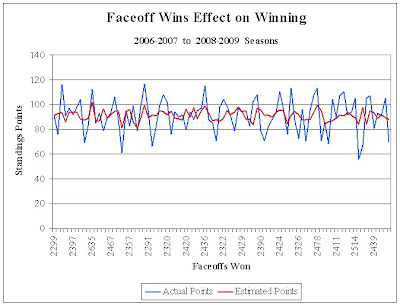My last post discussed the importance of faceoffs on winning in the NHL, and looked at data for the current season to see what was happening at the empirical level. As we discovered, winning faceoffs had only a slightly positive correlation with winning, and that the variability around the estimated effect was very high.
As promised I took a look at a larger data sample to see what effect winning faceoffs had on winning games. I used data for the 2006-07, 2007-08 and 2008-09 seasons and found some interesting results. Below is the chart showing estimated standings points based on the coefficients estimated from a regression using face off wins and number of face offs taken as control variables. While the coefficient of determination for this regression was low with an R-Squared was around 9% (meaning that around 90% of the variability in the model was not captured by winning face offs), all of the dependent variables were statistically significant at the 5% confidence level.
As can be seen, the positive correlation seen in the data from this year is emphatically washed out by data for a 3-year period. There is really no discernible conclusions to draw from the statistics over time other than face offs do not have a very meaningful effect on winning, as a stand alone measure.
I have some trouble accepting the conclusion that consistently winning face offs through out a season does not lead to more opportunity to win. Perhaps a more telling statistic would be percentage of games that a team wins the head to head face off win category, as that may smooth out any noise introduced into the model by specific games which feature a lot of face offs (this is, on a team by team basis controlled by the model, but not on a specific game by game basis) and will isolate who was better that game, which have more implications on winning. As it is measured now, as a summation of wins across a season, may erase the descriptive value of the statistic.
Also, face off wins are not seperated by a win in a scoring zone versus the neutral zone. If the neutral zone face off wins were taken out of the model, thus removing face off scenarios which are less likely to lead to scoring situations, we may see more correlations to face off wins leading to wins. These are studies which are heavily data intensive and thus are time consuming to execute, however I think that this is a fascinating aspect of the game to examine, and that there are value-centered results that can come from finding meaningful analysis to what the data show. Time to dig deeper.
Subscribe to:
Post Comments (Atom)

1 comment:
5-5 faceoffs are a toss up, because even though you may win the faceoff, odds are there is someone there to pressure you. The power play is where they really count. Maybe that data can't be produced, but the win % for faceoffs on the powerplay/penalty are what matter
Post a Comment